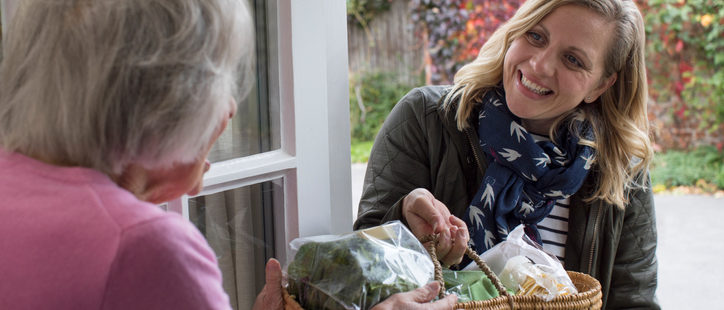We reflect on what organisations working to address loneliness have told us about supporting volunteers – a theme we’ll be discussing in our next Loneliness in the time of Covid-19 webinar.
Supporting volunteers
The Covid-19 pandemic has brought the work of those helping one another in our communities into sharp focus. While high profile campaigns such as the NHS Volunteer Responders attracted many hundreds of thousands of volunteers in a matter of days, the small acts of neighbourliness at the heart of mutual aid groups up and down the country have been just as important, if not more in some cases.
Many of the organisations who’ve taken part in our Loneliness in the time of Covid-19 series have told us that new volunteers have joined their programmes through the weeks and months of the pandemic, with many signing up to support people as befrienders.
“Befriending volunteers are increasingly faced with difficult conversations, as months of isolation take their emotional and psychological toll on people who have been alone throughout the pandemic.”
However, as we move out of the immediate crisis phase, many have told us about the range of challenges facing volunteers and organisations.
Burn out
Befriending volunteers are increasingly faced with difficult conversations, as months of isolation take their emotional and psychological toll on people who have been alone throughout the pandemic. Many volunteers are also facing difficult circumstances of their own and this combination is leading to increased stress and even burnout.
We’ll be bringing organisations together to share the work they are doing to support their volunteers to manage these strains
Managing the ‘new normal’
Many organisations are moving to blended models of working – continuing telephone and online delivery and re-starting some face-to-face activity. Many new volunteers have only ever been involved in remote delivery. We’ll be talking about the ways in which organisations are navigating the shift to new models of working, and how they plan to retain volunteers through this change.
Supporting older volunteers
Many organisations have attracted younger volunteers through the pandemic – including students, and people who were out of work or on furlough.
“As people on furlough return to work and students return to universities, many organisations are recognising the need to find new ways to reengage their older volunteers.”
However, they often lost out on the skills of their older volunteers, as many withdrew from volunteering due to social distancing guidance and shielding requirements.
As people on furlough return to work and students return to universities, many organisations are recognising the need to find new ways to reengage their older volunteers – some of whom want to restart in-person volunteering, but some of whom wish to maintain distance.
We’ll be talking to organisations about the work they are doing to build a diverse volunteering base in the wake of the pandemic and maintain the engagement of their older volunteers.
We know that the amazing organisations with which we work, up and down the country, hold between them a wealth of creative solutions and innovative approaches.





No comments on this article yet. Please feel free to submit a comment below.
By submitting a comment you grant Campaign to End Loneliness a perpetual license to reproduce your words and name/web site in attribution. Inappropriate and irrelevant comments will be removed at an admin's discretion. Your email is used for verification purposes only, it will never be shared.